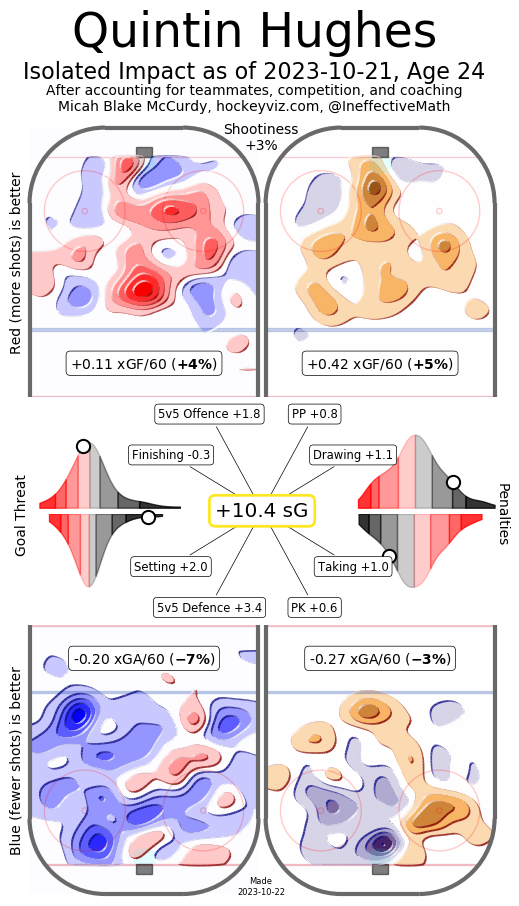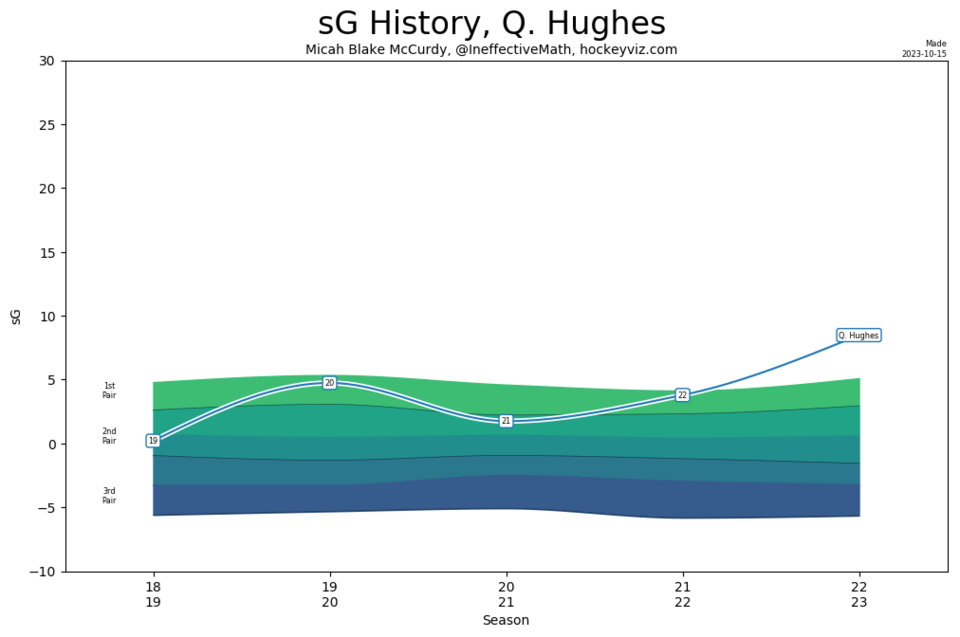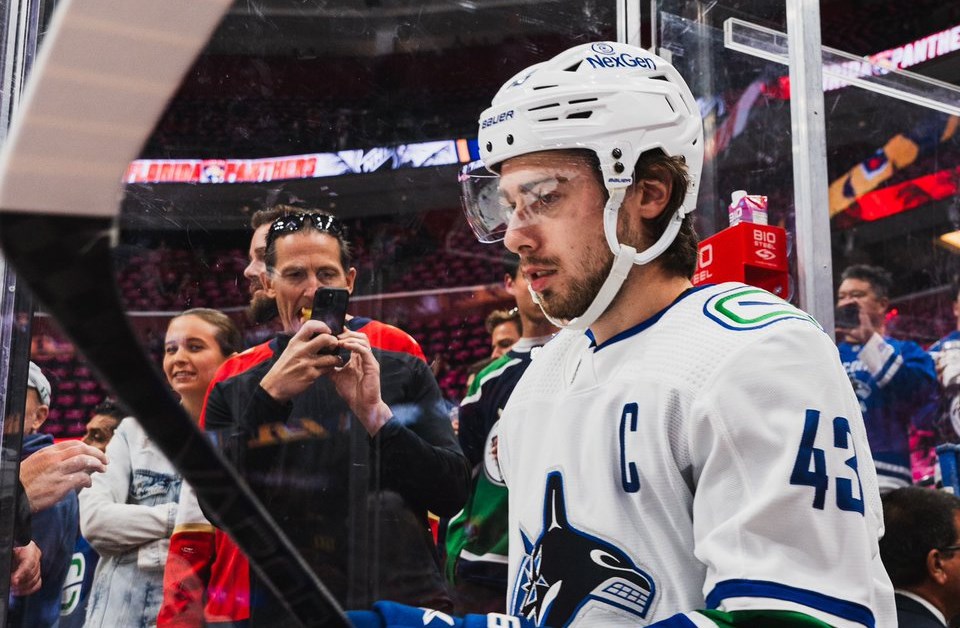Somehow, five years into his NHL career, Quinn Hughes is still underrated.
Hughes’ 2022-23 season should have firmly established him as one of the best defencemen in the NHL. With a franchise record 76 points in 78 games, Hughes finished second among NHL defencemen in points, behind only Norris Trophy winner Erik Karlsson. He averaged 25:40 in ice time per game, fourth in the NHL behind Cale Makar, Drew Doughty, and Rasmus Dahlin.
While Hughes piled up points on the power play, he was also a force at 5-on-5. He had a plus-20 goal differential at 5-on-5 despite playing for a team that was a minus-43 at 5-on-5 when he wasn’t on the ice.
And yet, despite such a fantastic season, Hughes is still the of NHL defencemen: he gets no respect at all.
He didn’t get any respect from the Professional Hockey Writers Association, which votes for the Norris Trophy. Hughes finished ninth in Norris voting, with just 13 of the 196 voters putting him in their top three. 166 votes left him off their five-player ballot altogether.
He didn’t get any respect from the NHL executives and players polled by ESPN last season for . Not only did Hughes not make the top ten list but he also wasn’t even one of the seven honourable mentions.
But two lists put together by the media ahead of the season have drawn the bulk of the ire for Canucks fans: and .
"It’s always been the media questioning my D game."
Hughes was ranked 60th on ESPN’s list, which is egregious. A wide array of forwards who score less than Hughes landed on the list ahead of him, which is a problem all by itself, but the more shocking result was Chicago Blackhawks defenceman Seth Jones landing ahead of Hughes at 52nd overall.
Jones had less than half as many points as Hughes last season and had a minus-24 goal differential at 5-on-5 last season. There is no world where he’s a better player than Quinn Hughes.
The lack of respect felt even more blunt in The Athletic’s ranking, however, because of their write-up of Hughes.
The Athletic placed Quinn Hughes in the third tier of NHL players, below defenceman peers like Rasmus Dahlin, Miro Heiskanen, and Roman Josi. To be fair, that’s still quite good: that’s the “All-Star” tier and affirms that Hughes is a number one defenceman, even if that tier is for “average” number one defencemen.
The write-up, however, called Hughes “defensively lacking” and said that “his play without the puck is an issue for both analysts and scouts.”
That’s the lazy analysis of Hughes’ game: if he’s an undersized defencemen who piles up points, he must be bad at defence.
It’s a stereotype that Hughes is used to hearing. Even in his rookie season, Hughes was battling against that cliché.
“I’ve never worried about my defensive game, it’s always been the media questioning my D game,” said Hughes. “As a 5’10” defenceman, that’s just the thing to do. I’ve always felt comfortable with my D game. For me, I’ve just got to keep playing hard and strong.”
Last season, Hughes was even more direct in .
“Anyone who says I’m a defensive liability, frankly, hasn’t watched the games,” he said.
Hughes is far better defensively than people think
The truth is, Hughes has been matching up against the best players in the NHL for years now. Right from the first game of his rookie season, Hughes was matched up against the toughest competition possible, as Travis Green hard-matched his rookie defenceman against Connor McDavid in game one, then continued to play him against top lines all season.
While Hughes had some defensive struggles during the 2020-21 season — perhaps because his most frequent defence partners were Travis Hamonic, Jordie Benn, and Tyler Myers — he has thoroughly bounced back in the last two seasons.
That shows in his isolated impact heatmap from , which shows that shot attempts against the Canucks are 7% less dangerous than the league average when he’s on the ice at 5-on-5, with a strong impact on the penalty kill as well.

Hughes had those strong underlying numbers despite never having a top-pairing caliber partner at any point during the season. He had to carry lesser partners, to the point that he even made AHL journeyman Noah Juulsen look like a legitimate top-four NHL defenceman for a dozen games.
Hughes has significantly improved his game
Trying to shove Hughes into the bucket with other undersized, defensively-suspect offensive defenceman is the shallowest of analysis. The quotes The Athletic got from NHL scouts and analysts betray just how shallow that analysis really is.
“He’s good,” said one scout quoted in the article. “I don’t know how good he is. I really don’t.”
From a journalist’s point of view, that’s when you go out and talk to someone who does know how good Hughes is.
They also quote an analyst as saying, “He has not gotten better or worse for me in years,” and, “He’s just been the exact same dude plugging along.”
There are two things happening here. One is what Hughes said: these guys haven’t watched the games. No one who has watched Hughes play would ever say that he has not gotten better or that he’s the “exact same dude.”
But it’s not just that: any analytical model should make it evidently clear that Hughes has gotten better.
For example, the Goals Above Replacement (GAR) model from Evolving Hockey showed Hughes taking a major leap forward last season. He went from 8.8 GAR in the 2021-22 season to 20.5 GAR in the 2022-23 season — second among all NHL defencemen.
Likewise, the Synthetic Goals (sG) model from HockeyViz showed a similar progression, as Hughes went from being a top-end top-pairing defenceman to one of the best defencemen in the NHL.

You can dumb it down even more. Forget the models and just look at points: Hughes went from 0.73 points per game in 2020-21 to 0.89 points per game in 2021-22 to 0.97 points per game in 2022-23. How could anyone possibly see that as “the exact same dude plugging along?”
The trick to getting respect: just win, baby
Here’s the thing: while the lack of respect for Hughes is infuriating for a lot of Canucks fans, it’s also completely understandable.
Hughes is the number one defenceman for a Canucks team that has missed the playoffs for three-straight seasons. In that time, the Canucks have not always been the most enjoyable team to watch. It honestly makes sense that a lot of people don’t know just how good Hughes is because it’s understandable that not a lot of people have gone out of their way to watch the Canucks play.
That’s not to mention that most Canucks games start at 10:00 p.m. Eastern time when the vast majority of the NHL media located in Toronto and New York are heading off to bed.
Most people around the NHL aren’t quite sure how good Hughes is because he hasn’t had an opportunity to prove how good he can be. And, in order to get that opportunity, the Canucks have to get back into the playoffs and go on a run.
The truth is that NHL analysts and scouts often conflate team success with individual success. Barring a truly exceptional season like Karlsson’s 101 points to win the Norris, players on non-playoff teams rarely get much attention in awards voting. There’s always the underlying tension of “How good can this player be if he wasn’t good enough to take his team to the postseason?”
Never mind that the Canucks have been a hot mess with more drama than a season of The Real Housewives — for a lot of people around and in the NHL, the blame for a losing team falls on its stars.
To shake loose from his undeserved reputation as a defensive liability and establish himself as an elite talent, Hughes has to get the Canucks back to the playoffs. Or, rather, he has to be seen as getting the Canucks back to the playoffs, as that’s not something one player can do on his own.
The one time Hughes has been to the playoffs, he dominated, putting up 16 points in 17 games in the 2020 bubble. Pulling off a repeat performance in the playoffs would surely get Hughes the respect he deserves.
More than that, a playoff run in front of a national audience might finally get people to see what Canucks fans already do: Hughes controls the game when he’s on the ice. Even the sleepiest of NHL media types in Toronto and New York might finally see that Hughes is not just an undersized offensive defenceman — he’s a complete player with a massive impact on all aspects of the game.
Hughes deserves respect but he won’t get it if the Canucks continue to fall short of the playoffs.




